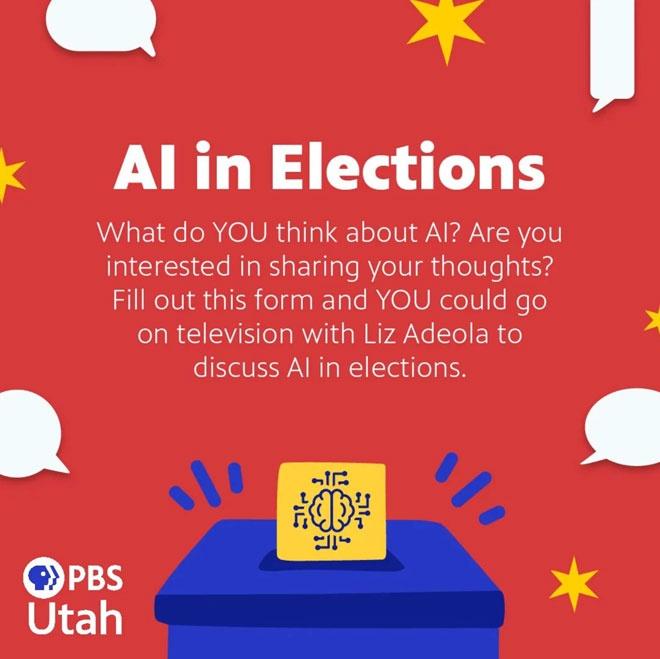Starting The Conversation
With Utah’s high rates of sexual violence, one group is looking to equip teens with the knowledge needed to keep them safe. Teen Council trains high school students to become sex educators for their peers, teaching them about consent and healthy relationships.
In this episode, we hear from Teen Council members Lupita Mendez and Morgan Pinkney about the limited sex education many teens get in Utah. And they tell us about their experiences teaching other students about things like consent. We also hear from Teen Council facilitators Zoe Flavin and Meda Del Carpio about the importance of comprehensive sex ed and the impact of peer to peer education.
Additional Resources
Teen Council Utah
Planned Parenthood of Utah Education Programs
Peer Education Institute
Utah Coalition Against Sexual Assault
Utah Domestic Violence Coalition
Teen Dating Violence Awareness & Prevention
That’s Not Cool
Rape Recovery Center
Utah Violence and Injury Prevention Program
RAINN - Laws in Your State
Subscribe to Podcast
Episode Transcript
ANDREA SMARDON: Before we get started, there are some discussions around sexual violence in this episode, but nothing graphic.
[MUSIC]
ANDREA: This is More Than Half, I’m Andrea Smardon. Today, we’re delving into the world of sex education for teens in Utah. As we’re going to hear, a lack of information can leave young people in the dark and at risk. But there’s a program that’s training teens themselves to become sex ed teachers for their peers. Leaders of the program say it not only helps young people make informed decisions, but it can also help prevent sexual violence.
[MUSIC STOPS]
ANDREA: Now, the More Than Half team is all a little older and further removed from our sex ed classrooms. And, some of us didn’t grow up in Utah. So one of our first questions was - what does sex ed look like for students here?
[MUSIC]
ANDREA: We spoke with Lupita Mendez and Morgan Pinkney, two recent high school graduates.
They both told us that they didn’t talk much with their parents about sex ed, something we learned was common for teens here. Which means school was the main place they could get information.
LUPITA MENDEZ: I think that my parents mostly thought school would teach me all I needed about sex ex.. Unfortunately, they were wrong, kind of, school did not really teach me a lot.
ANDREA: Lupita told us her school had a health class her freshman year.
LUPITA: They would kind of teach a sex ed portion, but honestly it wasn't really a lot. My teacher that I had there, he was super like, sexist and heteronormative.
ANDREA: Lupita remembers an assignment that students had to fill out about relationships. It was split up by gender, so males got one assignment, and females got another.
LUPITA: It had like, “what do you want in a boyfriend?”, like, “what do you look for in a boy?” I was pretty kind of upset about that cause I, myself am not, heterosexual. So I changed the words on it to say, “what do you look for in a person? What do you look for in a partner?” I did not enjoy it at all.
[MUSIC STOPS]
ANDREA: Morgan also remembers sex ed being very minimal in school.
MORGAN PINKNEY: The most prominent thing that I remember was just learning about the anatomy, but not learning about the sort of like human elements of it, and the emotions that come with it, and it was abstinence oriented and very like the only way to protect yourself from STDs or to prevent pregnancy is to wait to have sex until you're married.
ANDREA: But, Lupita and Morgan knew from conversations with their peers that some teens were having sex.
LUPITA: I guess like the staff or like adults would like to think that it works, like, sure just tell them not to, you know. But honestly, teens like in a high school they're experiencing different things or questioning a lot of things. It's like, it's the age of that kind of thing.
ANDREA: They worry that the topic is stigmatized and that teenagers may think they’re not supposed to talk about sex with the adults in their lives.
MORGAN: In Utah, I think a lot of it probably boils down to religion and not having sex until you're married. Just because if you're not married, it's like seen as, you know, like sinful. I’d imagine having those conversations with teenagers would probably be taboo.
LUPITA: I feel like maybe that's where a lot of the stigma comes from too. Like, ‘Oh, they told me not to do this. So I guess I just will never ask anyone what to do in this situation.’
[MUSIC]
ANDREA: Teen Council is a program looking to change the conversation around sex ed. It’s a national program run by Planned Parenthood with chapters in 14 states. Each program is unique to the state and county it’s in. It trains high school students to become sex ed resources for their peers.
LUPITA: Once I learned what Teen Council is, like a peer led sexual education group, I was like super interested.
ANDREA: Luptia got involved with Teen Council two years ago during her junior year. She saw a student in her math class with a Teen Council binder, and she was intrigued.
LUPITA: Just hearing that there was this group that I could possibly join in Utah, I was just like, okay, like I need to join this, that sounds so cool.
ANDREA: Once she joined, Lupita says she liked how the group felt inclusive.
LUPITA: It's just this place where like, nobody is going to tell you that like you're wrong or you're not valid or something. It's kind of cheesy, but you could really be yourself.
ANDREA: Morgan started with Teen Council his senior year. Before joining, he found that whenever he had questions about sex ed, he would turn to his friends in Teen Council.
MORGAN: Because it was so much more approachable than going up to our, you know, football coach who was forced to teach sex ed and being like, Hey...uh, can you help me? You know?
ANDREA: He was asked to be part of a Teen Council panel about gender identity and realized he wanted to get involved.
MORGAN: I go to school and I have a job on the weekends, but Teen Council gave me a lot of purpose because we were doing something important and that would actually, you know, affect other people in a positive way.
[MUSIC STOPS]
ANDREA: Teen Council focuses on providing comprehensive sexual education, which looks to equip young people with information on pregnancy, sexually transmitted infections, consent, and healthy relationships. Zoe Flavin is the Education Manager at Planned Parenthood Association of Utah and a facilitator for Teen Council. She says the program has a major impact on the teens involved.
ZOE FLAVIN: Just having like a comprehensive knowledge about sex and sexuality really helps an individual when starting to navigate relationships, sex life, things like that.
ANDREA: One important thing to note is that Teen Council does not promote sexual activity, but instead focuses on providing a safe space to ask questions. Zoe calls their approach “values neutral.”
ZOE: We're not telling teens to have sex. We're not telling kids to never have sex. Like we're just saying, here's some, here's the information, here's some strategies to make decisions, and here’s some resources for support and stuff like that.
ANDREA: Teen Council participants like Lupita and Morgan meet weekly with facilitators to cover a wide range of sex and relationship topics. The aim is to make sure they are reliable resources for their peers. Meda Del Carpio is a Planned Parenthood Community Educator and Teen Council facilitator. She says the Teen Council members provide accurate and correct medical information.
MEDA DEL CARPIO: Like if their friends need to go to someone, they can go to Teen Council, and it’s pretty awesome, like we record our numbers and on average I think we have like over 500 conversations this year, which is pretty amazing.
ANDREA: Zoe and Meda both see the difference peer to peer education makes.
MEDA: I feel like when the educator's like closer in age to the audience, they definitely open up more.
ANDREA: Zoe remembers walking into a classroom of teens for a lesson last spring.
ZOE: The first class was like, kind of awkward, everyone was pretty much silent, and I was just kind of kind of doing my thing. And then a Teen Council member came in the next time and they just like wouldn't stop talking. They had all these questions for her. They would get really specific. Like I cannot emphasize enough how much having Teen Council members with other teens just changes the whole dynamic of the space.
ANDREA: What these young people are learning and teaching in Teen Council has repercussions far beyond high school. It’s not just about avoiding pregnancy or not getting a disease. These conversations touch on a critical issue for women in Utah - sexual violence.
The state is ranked 11th nationally for rates of sexual violence. One in three Utah women will experience some kind of sexual assault in their lifetime. And young people face extra barriers when going to college, where nationally 13% of students report non-consenual sex.
MEDA: A problem that I encounter is that a lot of people just don't know what consent is, and not just teens but adults as well. Because we don't talk about it enough so we don't talk about it at home.
ANDREA: But, in Teen Council they’re having honest conversations about things like consent and healthy relationships. They see comprehensive sex education as a tool to prevent sexual violence. Meda says having these conversations about boundaries early is imperative.
MEDA: We even have pamphlets about how to teach about consent for every age, like you know, ask him for like permission to borrow toys and whatnot when you're a kid.
ANDREA: While the focus of Teen Council is high school students, Zoe says the Teen Council members and facilitators also teach lessons about consent to younger students.
ZOE: So kind of starting with puberty education and helping fourth and fifth graders understand their boundaries and that they have bodily autonomy. And then going up into Teen Council, kind of really equipping teens with the knowledge. I mean it makes a huge impact on how people understand what their boundaries are and what's appropriate and inappropriate.
ANDREA: The facilitators believe this model of giving the teens knowledge sets them up for success regardless of what’s thrown at them. Meda sees Teen Council as an opportunity to help students develop their critical thinking skills.
[MUSIC]
MEDA: It's not so much about like what we teach them, but it's starting the conversations and having like the students think about what they want and what they don't want in a relationship. It’s so amazing to see how they’re like “oh wow, I never thought about that.” or “okay that’s good to know.”.
ANDREA: It means the Teen Council participants are better able to take what they’re learning and help their peers with real-world problems. Lupita remembers when a friend came to her asking for condoms.
LUPITA: I knew her boyfriend at the time, and we just got talking about it, about their relationship. And she kind of confessed to me that she didn't exactly want to have sex with her boyfriend. And he was kind of the one who was more pressuring her, so I was like very concerned.
ANDREA: Lupita saw it as an opportunity to take the conversation deeper.
LUPITA: I talked to her and I was like, if you have to be forced to say yes, or something like that, that's, that's not really consent. If you don’t want to, you don’t have to. We had this long conversation about it, and at the end of it, I felt like she was more relieved.
[MUSIC STOPS]
ANDREA: Teen Council helped Lupita start to understand the complexities of consent, which go beyond simply saying “No.” Morgan admits his own understanding around consent was largely undefined before his time in Teen Council.
MORGAN: Well, I hadn't even really heard the word until I was like 15, I just thought it was saying yes, but I didn't even like, think about being pressured. I guess in my head in a relationship, it like didn't really need to happen every time. Cause it's like, that person is your partner. I had no idea how complex it was.
ANDREA: Morgan says learning the complete definition of consent was some of the most valuable information he got during his time with Teen Council.
MORGAN: Understanding, sort of coercion in a relationship, also I found was really helpful. Because I don't think that is something that I would have noticed, had I not been involved with Teen Council. And so I would imagine that a lot of teens wouldn't really think about coercion either.
ANDREA: Because of this, Morgan makes sure to share his knowledge with others. He educates his peers by using an acronym he learned at Teen Council -- F.R.I.E.S.
MORGAN: So consent has to be freely given, it is reversible, it is informed, it's enthusiastic, and it's specific. I think a lot of students aren't aware of that. So if people are understanding how to recognize maybe a harmful relationship that has maybe sexual violence in it, then they can know, sort of, how to get out of that. Having that open dialogue is really important in these conversations about sexual violence, because I think the education truly is just the most powerful thing that you can have.
[MUSIC]
ZOE: There's a big piece of Teen Council that's about advocating for oneself and one's community that I think like is inseparable from consent and healthy relationships and things like that.
ANDREA: Zoe says the skills students gain in Teen Council go beyond just having more knowledge about sex and relationships. It prepares them for whatever’s ahead. Morgan hopes to become a teacher in the future and says his time in Teen Council helped him grow. Lupita isn’t sure what her future holds, but knows she’ll go forward with more confidence.
LUPITA: I definitely think that with the topics we’re taught in Teen Council that I’ll know when something is unsafe or safe. It made me a lot more confident that I could guide myself through some things. I don’t know, I feel a lot safer, a lot more comfortable.
ANDREA: The program currently has Teen Council’s in Salt Lake, Wasatch, and Summit County. Starting in January, Teen Council will partner with Eastern Utah Women's Health to create a Teen Council serving Iron, Grand, and Carbon counties. Teen Council hopes to reach more areas of the state, but in the mean time Planned Parenthood has other resources to support families looking to expand their conversations around sex. And both Morgan and Lupita agree that even though they’re time in Teen Council is over, they’re going to keep having conversations.
LUPITA: I'll take like all of the things that I've learned and share it with as many people as I can.
ANDREA: To learn more about Teen Council or about sexual violence in Utah, visit www.pbsutah.org/morethanhalf
This is a PBS Utah production. Subscribe wherever you get your podcasts and please rate and review. Research, interviews and production conducted by Alicia Rice and Ashley Swansong. Audio mixing by Will Montoya.
We’re going to be taking a short hiatus over the holiday break, but we’ll be back in January 2021.
[MUSIC STOPS]





